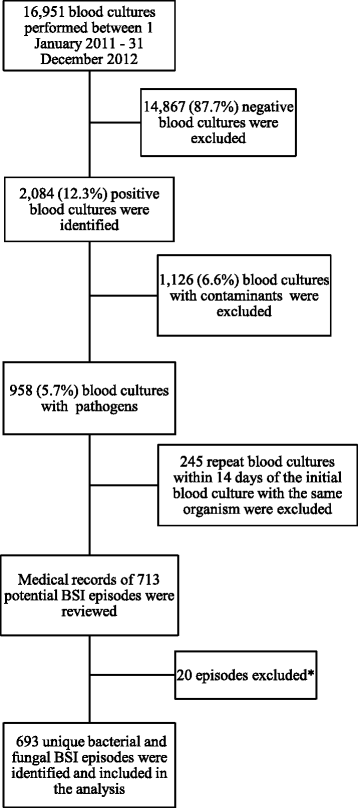Bloodstream infections at a tertiary level paediatric hospital in South Africa
- PMID: 29207958
- PMCID: PMC5718141
- DOI: 10.1186/s12879-017-2862-2
Bloodstream infections at a tertiary level paediatric hospital in South Africa
Abstract
Background: Bloodstream infection (BSI) in children causes significant morbidity and mortality. There are few studies describing the epidemiology of BSI in South African children.
Methods: A retrospective descriptive cohort study was conducted at a paediatric referral hospital in Cape Town, South Africa. The National Health Laboratory Service (NHLS) microbiology database was accessed to identify positive blood culture specimens during the period 2011-2012. Demographic and clinical details, antimicrobial management and patient outcome information were extracted from medical and laboratory records. Antibiotic susceptibility results of identified organisms were obtained from the NHLS database.
Results: Of the 693 unique bacterial and fungal BSI episodes identified during the study period, 248 (35.8%) were community-acquired (CA), 371 (53.5%) hospital-acquired (HA) and 74 (10.7%) healthcare-associated (HCA). The overall risk was 6.7 BSI episodes per 1000 admissions. Escherichia coli, Staphylococcus aureus and Streptococcus pneumoniae were the most frequent causes of CA-BSI and Klebsiella pneumoniae, Acinetobacter baumanii and S.aureus were most commonly isolated in HA-BSI. On multivariable analysis, severe underweight, severe anaemia at the time of BSI, admission in the ICU at the time of BSI, and requiring ICU admission after BSI was diagnosed were significantly associated with 14-day mortality.
Conclusion: This study adds to the limited literature describing BSI in children in Africa. Further studies are required to understand the impact that BSI has on the paediatric population in sub-Saharan Africa.
Keywords: Africa; Antimicrobial resistance; Bloodstream infections; Children.
Conflict of interest statement
Ethics approval and consent to participate
Ethics approval was obtained from the Human Research Ethics Committee, Faculty of Health Sciences, University of Cape Town; reference number: HREC 619/2012. Informed consent was not obtained from individual patients as the data was collected and collated retrospectively, and patient details were anonymised before data analysis.
Consent for publication
Not applicable
Competing interests
The authors declare that they have no competing interests.
Publisher’s Note
Springer Nature remains neutral with regard to jurisdictional claims in published maps and institutional affiliations.
Figures
References
-
- Crump JA, Ramadhani HO, Morrissey AB, Msuya LJ, Yang L-Y, Chow S-C, et al. Invasive bacterial and fungal infections among hospitalised HIV-infected and HIV-uninfected children and infants in northern Tanzania. Tropical Med and International health. 2011;16(7):830–837. doi: 10.1111/j.1365-3156.2011.02774.x. - DOI - PMC - PubMed
MeSH terms
Substances
LinkOut - more resources
Full Text Sources
Other Literature Sources


